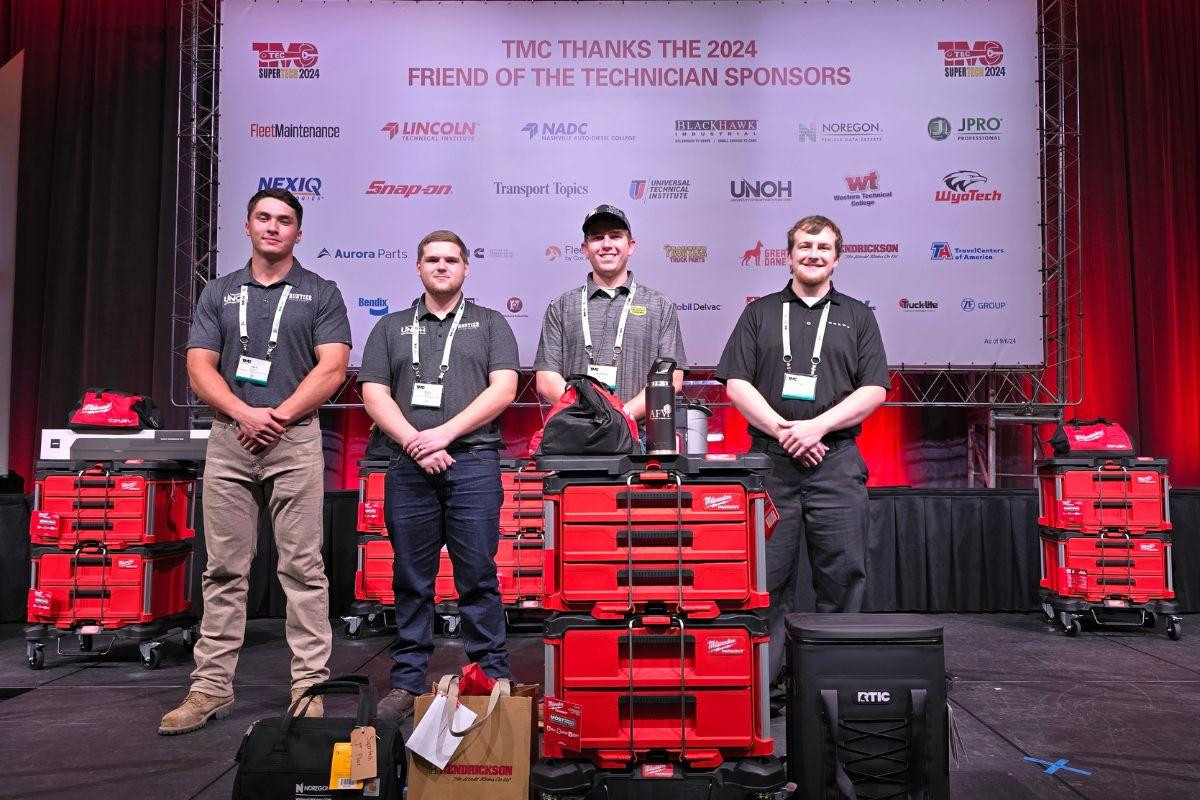The technical skills of four aspiring technicians from the University of Northwestern Ohio (UNOH) were tested under pressure during the TMC FutureTech Competition held Sept. 15-19 in Raleigh, NC.
Students Kody Pond, Riley Larr, Anthony McCarty and Jack Lorenz were evaluated on their ability to apply their knowledge of areas relevant for technicians including electrical circuit testing, Automotive Service Excellence (ASE) testing, cybersecurity, lubricants and fuels, coolant depth, oil and alternative fuels. The event featured about 20 total participants and 16 total stations, Pond told Autobody News. Pond expects to graduate in December with an associate’s degree.
Lorenz placed third overall at the event, winning the stations of lubricants and fuels, coolants and diesel exhaust fluid, cybersecurity, and central tire inflation, according to a Sept. 18 UNOH press release. Larr ranked first at the alternative fuels station, according to Lauren Reinhold, diesel and agricultural technology instructor at UNOH’s College of Applied Technologies.
UNOH’s diesel technology classes, as of August, comprise 644 students, 100 of whom are enrolled in light-duty courses either as a standalone light-duty diesel technology program or in combination with an automotive technology degree program. Light-duty enrollees focus on 8-liter and smaller diesel engines, designed for consumer cars and trucks, and compact tractor and skid-steer engines, UNOH spokesperson Stephanie Malloy told Autobody News.
The four students Autobody News interviewed are enrolled in the heavy-duty diesel program, but the students’ experiences in the FutureTech Competition are relevant to light-duty trainees, because many future-tech capabilities apply across both light- and heavy-duty vehicles.
For example, alternative fuels like hydrogen and compressed natural gas are available in select markets for both light- and heavy-duty vehicles, and ASE testing is relevant for both light- and heavy-duty vehicles.
Despite the level of education required to excel in the competition, the students said the most challenging aspect of the event boiled down to something a lot more practical -- time management.
“None of these stations are really designed to be completely finished,” Larr said. “Otherwise, you wouldn't be able to determine a winner. So, trying to figure out how to balance getting as much done as you can while doing it accurately is really hard. For instance, the alternative fuel station had 100 questions for 23 minutes of time. So, it was very difficult to figure out what to answer, prioritize what to do, stuff like that.”
Larr finished his associate’s degree in heavy diesel last quarter, and is currently enrolled in UNOH’s business school.
The students expressed gratitude that UNOH and industry sponsors invested time in training them and ensuring they could get to the event.
“It means a lot to me,” Pond said. “Especially because I eventually plan on coming back and teaching here. So, it has really helped me working with different instructors preparing for this competition. It's really given me the opportunity to see the people I'd eventually be working with, and get an idea of what the workplace is like.”
As part of the TMC FutureTech competition, the students attended technician training programs, networked with industry peers and received prizes from sponsors including tools, workwear and gift cards.
Lorenz, who plans to graduate from the heavy-duty diesel program in November 2025, said the college prepares its students well for the workforce, but there are a few areas he wishes his education covered more deeply.
“The areas that they do cover, I think they cover pretty well,” he said. “Things like after-treatment systems is one that we don't really touch too much on here at the school. We definitely saw a lot of that in the competition.”














Brian Bradley